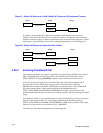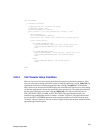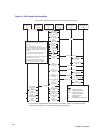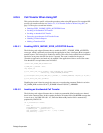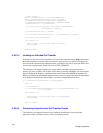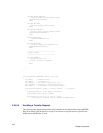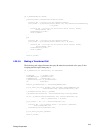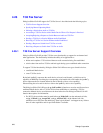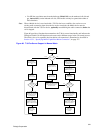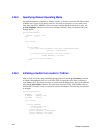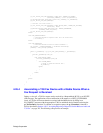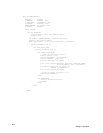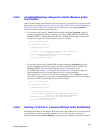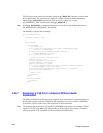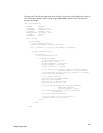320
Dialogic Corporation
4.26 T.38 Fax Server
Dialogic
®
Global Call API support for T.38 Fax Server is described under the following topics:
• T.38 Fax Server Support Overview
• Specifying Manual Operating Mode
• Initiating a Switch from Audio to T.38 Fax
• Associating a T.38 Fax Device with a Media Device When a Fax Request is Received
• Accepting/Rejecting a Request to Switch Between Audio and T.38 Fax
• Sending a T.38 Fax in a Session Without Audio Established
• Receiving a T.38 Fax in a Session Without Audio Established
• Sending a Request to Switch from T.38 Fax to Audio
• Receiving a Request to Switch from T.38 Fax to Audio
4.26.1 T.38 Fax Server Support Overview
Dialogic
®
Global Call API provides T.38 fax server functionality to support fax-on-demand and
other applications. The functionality includes the ability of an application to:
• initiate and complete a T.38 session without an audio connection being first established
• switch coders from audio to T.38 fax and back again during a pre-established audio connection
To support T.38 fax functionality, Dialogic
®
Global Call API uses two types of media devices:
• a traditional Media device
• a new T.38 Fax device
By default, ipmBxCy represents the media device on board x and channel y, which has no fax
capability on HMP. By associating the corresponding voice handle with a fax handle, the ipmBxCy
device represents the fax channel defined by the fax handle, with no voice capability.
Disassociating the voice and fax devices restores the ipmBxCy device voice capability.
The Dialogic
®
Global Call API uses the gc_SetUserInfo( ) function to associate and disassociate a
traditional Media device with a T.38 Fax device when establishing or concluding a T.38 fax
connection. Manual device association must be done before the next Dialogic
®
Global Call API
function that requires fax information:
• For H.323, the association must be made before gc_MakeCall( ) on the outbound call side,
and gc_CallAck( ), gc_AcceptCall( ) and gc_AnswerCall( ) on the inbound call side,
whichever occurs first since the underlying “open logical channel” can happen at any of these
times if coder capabilities and fax port information is available.



